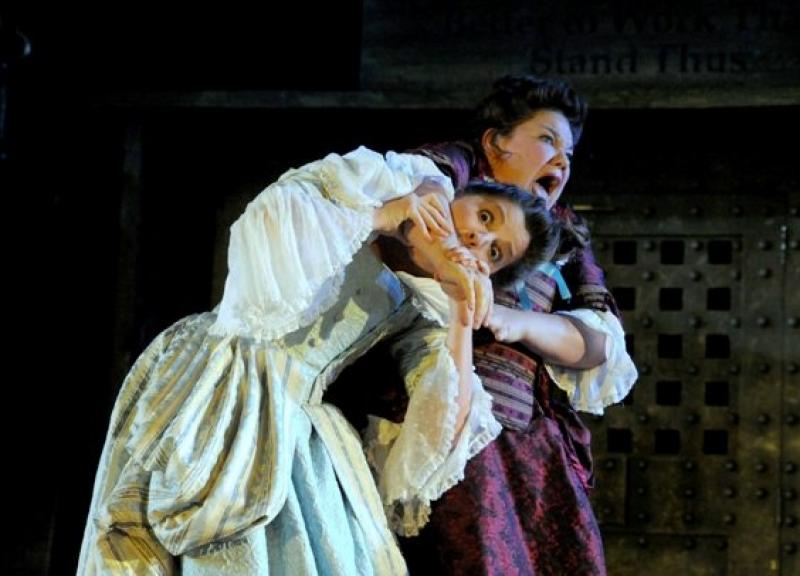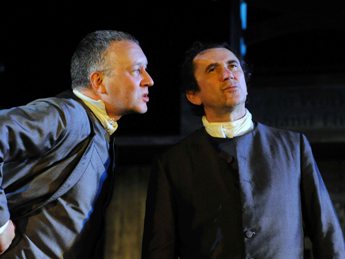The Beggar's Opera, Regent's Park Open Air Theatre | reviews, news & interviews
The Beggar's Opera, Regent's Park Open Air Theatre
The Beggar's Opera, Regent's Park Open Air Theatre
Underpowered production of John Gay's classic satire

John Gay’s 1728 satirical drama was the first ballad opera. The vernacular work not only cocked a snook at the Italian operas that were so in vogue in 18th-century London, but it also lampooned Whig politician Sir Robert Walpole and the British love for scoundrels. It was an instant, huge hit; as a witticism of the time had it, The Beggar’s Opera made Rich gay, and Gay rich.
The work, which many people know through its later incarnation, Kurt Weill and Bertolt Brecht’s The Threepenny Opera, was suggested by Gay’s friend Jonathan Swift, no mean satirist himself, who envisioned “a Newgate pastoral among the thieves and whores there” and the stage is entirely populated by low-lifes - highwaymen, thieves, prostitutes and corrupt officials.
The story has nods to real-life anti-heroes such as Jack Sheppard, who escaped thrice from the notorious Newgate prison, and is rife with double-dealing. It opens with Mr Peachum (a nicely sly Jasper Britton), who is both a fence and thief-catcher, deciding which thieves (the unproductive ones, that is) he will turn in for hanging. Mrs Peachum (Janet Fullerlove, giving good bawd), who is no slouch at nefarious activities herself, tells him their daughter, Polly, has secretly married Captain Macheath (David Caves), a notorious blaggard who is the leader of a gang of robbers and pickpockets.
The Peachums are not, however, worried for Polly’s virtue; rather they don’t want to lose an asset to their business and so devise a plan to have Macheath arrested and then executed. Polly overhears her parents and tells Macheath that he must flee immediately, but he is betrayed by the whores he keeps company with and is taken to Newgate, run by the corrupt jailer Mr Lockit - Phil Daniels (pictured below with Jasper Britton) giving a suitably slimy performance. Lockit looks after his charges, but always at a price - Macheath is offered a choice of handcuffs and if he wants the lighter ones he’ll have to pay for the privilege. Macheath has also been dallying with, among many others, Lockit’s daughter, Lucy, who is now pregnant and believes Macheath when he denies being married to Polly. She helps him to escape but he is again captured and sentenced to be hanged, and we await to see what dastardly plan Macheath can enact this time to save himself from the noose.
Macheath has also been dallying with, among many others, Lockit’s daughter, Lucy, who is now pregnant and believes Macheath when he denies being married to Polly. She helps him to escape but he is again captured and sentenced to be hanged, and we await to see what dastardly plan Macheath can enact this time to save himself from the noose.
Such a great story, peopled by vivid, if unlikeable, characters, using theatrically rich language - the script is littered with words such as slut, strumpet and harlot - should be a romp, but Lucy Bailey’s underpowered production fails to catch fire. The pace drags - strangely, considering that Punchdrunk’s Maxine Doyle is credited as movement director - and, while there is a lot of bawdiness on stage, the comedy mostly falls flat. The music is performed with vim but the singing is uneven.
The scenes between Macheath’s vying wives Lucy (Beverly Rudd) and Polly (Flora Spencer-Longhurst) are the evening’s strongest, and their feisty exchanges bring some badly needed laughs. William Dudley’s niftily multi-purpose design, in which huge carts serve as tumbrils, beds, prison cells and a robbers’ den, is a delight, and Bailey makes lovely nods to Gay’s near contemporary William Hogarth in the set pieces. There is also a magnificent coup de théâtre at the end, but sadly what has gone before isn’t quite so witty or shocking.
Explore topics
Share this article
Add comment
The future of Arts Journalism
You can stop theartsdesk.com closing!
We urgently need financing to survive. Our fundraising drive has thus far raised £49,000 but we need to reach £100,000 or we will be forced to close. Please contribute here: https://gofund.me/c3f6033d
And if you can forward this information to anyone who might assist, we’d be grateful.

Subscribe to theartsdesk.com
Thank you for continuing to read our work on theartsdesk.com. For unlimited access to every article in its entirety, including our archive of more than 15,000 pieces, we're asking for £5 per month or £40 per year. We feel it's a very good deal, and hope you do too.
To take a subscription now simply click here.
And if you're looking for that extra gift for a friend or family member, why not treat them to a theartsdesk.com gift subscription?
more Theatre
 Edinburgh Fringe 2025 reviews: Ordinary Decent Criminal / Insiders
Two dramas on prison life offer contrasting perspectives but a similar sense of compassion
Edinburgh Fringe 2025 reviews: Ordinary Decent Criminal / Insiders
Two dramas on prison life offer contrasting perspectives but a similar sense of compassion
 Edinburgh Fringe 2025 reviews: Kinder / Shunga Alert / Clean Your Plate!
From drag to Japanese erotica via a French cookery show, three of the Fringe's more unusual offerings
Edinburgh Fringe 2025 reviews: Kinder / Shunga Alert / Clean Your Plate!
From drag to Japanese erotica via a French cookery show, three of the Fringe's more unusual offerings
 The Two Gentlemen of Verona, RSC, Stratford review - not quite the intended gateway drug to Shakespeare
Shakespeare trying out lots of ideas that were to bear fruit in the future
The Two Gentlemen of Verona, RSC, Stratford review - not quite the intended gateway drug to Shakespeare
Shakespeare trying out lots of ideas that were to bear fruit in the future
 Edinburgh Fringe 2025 reviews: The Horse of Jenin / Nowhere
Two powerful shows consider the Israeli-Palestinian conflict, with mixed results
Edinburgh Fringe 2025 reviews: The Horse of Jenin / Nowhere
Two powerful shows consider the Israeli-Palestinian conflict, with mixed results
 Edinburgh Fringe 2025 reviews: The Fit Prince / Undersigned
A joyful gay romance and an intimate one-to-one encounter in two strong Fringe shows
Edinburgh Fringe 2025 reviews: The Fit Prince / Undersigned
A joyful gay romance and an intimate one-to-one encounter in two strong Fringe shows
 Tom at the Farm, Edinburgh Fringe 2025 review - desire and disgust
A visually stunning stage re-adaptation of a recent gay classic plunges the audience into blood and earth
Tom at the Farm, Edinburgh Fringe 2025 review - desire and disgust
A visually stunning stage re-adaptation of a recent gay classic plunges the audience into blood and earth
 Works and Days, Edinburgh International Festival 2025 review - jaw-dropping theatrical ambition
Nothing less than the history of human civilisation is the theme of FC Bergman's visually stunning show
Works and Days, Edinburgh International Festival 2025 review - jaw-dropping theatrical ambition
Nothing less than the history of human civilisation is the theme of FC Bergman's visually stunning show
 Every Brilliant Thing, @sohoplace review - return of the comedy about suicide that lifts the spirits
Lenny Henry is the ideal ringmaster for this exercise in audience participation
Every Brilliant Thing, @sohoplace review - return of the comedy about suicide that lifts the spirits
Lenny Henry is the ideal ringmaster for this exercise in audience participation
 Edinburgh Fringe 2025 reviews: The Beautiful Future is Coming / She's Behind You
A deft, epoch-straddling climate six-hander and a celebration (and take-down) of the pantomime dame at the Traverse Theatre
Edinburgh Fringe 2025 reviews: The Beautiful Future is Coming / She's Behind You
A deft, epoch-straddling climate six-hander and a celebration (and take-down) of the pantomime dame at the Traverse Theatre
 Good Night, Oscar, Barbican review - sad story of a Hollywood great's meltdown, with a dazzling turn by Sean Hayes
Oscar Levant is an ideal subject to refresh the debate about media freedom
Good Night, Oscar, Barbican review - sad story of a Hollywood great's meltdown, with a dazzling turn by Sean Hayes
Oscar Levant is an ideal subject to refresh the debate about media freedom
 Edinburgh Fringe 2025 reviews - Monstering the Rocketman by Henry Naylor / Alex Berr
Tabloid excess in the 1980s; gallows humour in reflections on life and death
Edinburgh Fringe 2025 reviews - Monstering the Rocketman by Henry Naylor / Alex Berr
Tabloid excess in the 1980s; gallows humour in reflections on life and death
 Edinburgh Fringe 2025 reviews: Lost Lear / Consumed
Twists in the tail bring revelations in two fine shows at the Traverse Theatre
Edinburgh Fringe 2025 reviews: Lost Lear / Consumed
Twists in the tail bring revelations in two fine shows at the Traverse Theatre

Comments
...
...